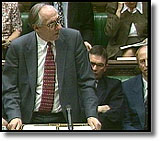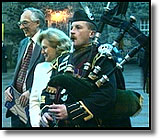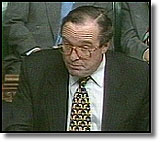
|
Scottish Devolution ProposalsThe Government has set out its plans for the biggest devolution of power away from Westminster, proposing to give Scotland a parliament with law-making and tax-setting powers.In return, Scotland will have to accept a reduction in the number of Scottish MPs at Westminster, where it has more MPs per voter than any other part of the United Kingdom. The Scottish Secretary, Donald Dewar, promised that the new Parliament would "fairly reflect opinion throughout Scotland". The Scottish MPs are to be elected in a system mixing 'first past the post' constituencies with elements of proportional representation. Mr Dewar said the post of Scottish Secretary would not be abolished to make sure that Scottish interests would continue to be represented within the UK government.
The Scottish people will be able to vote on both devolution and plans to give the new parliament tax-setting powers. The referendum will be held on September 11. Opinion polls suggest that they will vote in favour of both. If they say 'Yes' to a parliament for Scotland, the new Scottish MPs will have authority to legislate in a number of policy areas. These would include:
The primary matters to be retained by the UK Parliament would be:
If the Scottish people agree to give the Scottish MPs tax-raising powers, then the new Parliament could vary the level of income tax by 3% up or down the standard national rate.
A Scottish Parliament for the New MilleniumMr Dewar said the first elections for the Scottish Parliament would be held in 1999, with a target of January 2000 for it to assume its full responsibilities.The Scottish Parliament will have 73 members elected on the traditional 'first past the post' system -- one for each of the mainland constituencies and one each for Orkney and Shetland. And there will be 56 additional members elected by proportional representation from lists drawn up by the political parties. In that way it is similar to the planned Welsh Assembly. The House of Commons will debate the proposals for Scottish devolution next week.
"Sombre Day for Scotland"The Conservative party, since the last election without a single Scottish MP, warned that the Government's plans would stir up nationalism and lead to the break-up of the United Kingdom. Michael Ancram, Tory spokesman for Constitutional Affairs, said it was a "sombre day for Scotland" and called the plans "dangerous, damaging and dishonest". Mr Ancram predicted that Scotland could be marginalised within the UK, and that Scottish voters' pockets would be "inevitably hit". The vast majority of Scottish Labour MPs is in favour of devolution, as are the Scottish National Party and the Liberal Democrats. The Government could, though, encounter several hurdles in the House of Lords. The Upper House has already inflicted defeat on the Government over this issue. Devolution for Scotland and Wales was one of Labour's key manifesto commitments, and the Scottish White Paper comes only two days after the Government published its plans for a Welsh assembly.
|
Diana, Princess of Wales, 1961-1997
Conference 97
Devolution
The Archive
News |
Issues |
Background |
Parties |
Analysis |
TV/Radio/Web
Interactive |
Forum |
Live |
About This Site
News |
Issues |
Background |
Parties |
Analysis |
TV/Radio/Web
Interactive |
Forum |
Live |
About This Site
© BBC 1997 |
politics97@bbc.co.uk |


